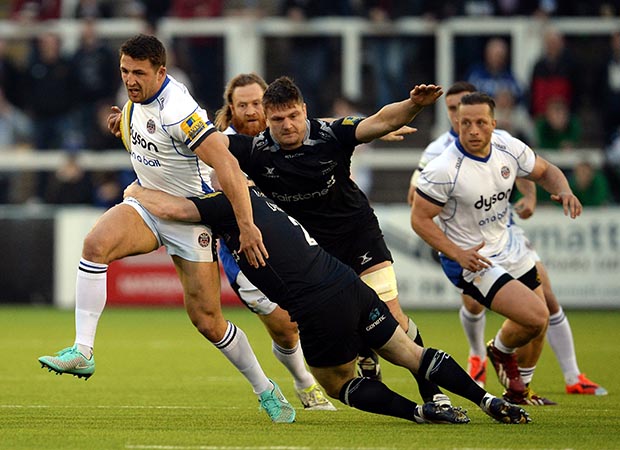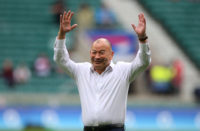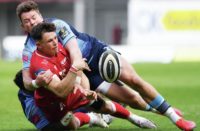(Picture: Getty Images)
By Brendan Gallagher
SALE entertain Newcastle on Friday night in the big northern derby – or the Sharks play the Falcons if you prefer – and both clubs seem in buoyant mood with everything to play for.
Sale, given their quality signings over the summer, can surely at least target a place in the play-offs while given last season’s improvements Newcastle should be aiming for a top six spot and a place in the European Challenge Cup.
The fact remains, however, that in the 30 seasons of Courage League and Premiership rugby – the former started in the 1987-88 season – these two powerhouses of northern rugby have garnered just two titles between them.
And a possibly larger than expected cast of other northern clubs who have featured in either the old Courage League First Division or the Premiership makes for sorry reading with more than one currently struggling for their very existence.
The feeling persists that northern clubs generally have under-performed in the top flight but is that fair? In the dog eat dog world of professional rugby is it unrealistic to expect them to compete against the big hitters from the South and the Midlands?
Should we in fact be praising the likes of Sale who by hook or by crook are starting their 24th consecutive season the top flight?
First we ought to set out what constitutes the North in rugby terms.
My hugely unscientific definition is any team north of Nottingham. In fact if you play your rugby in Penzance or Exeter, Nottingham seems like the North as well, it’s certainly a hell of a drive up the motorways.
I’m almost tempted to include them as well. If we go back to the dawn of ‘modern’ league rugby and that inaugural Courage First Division what strikes you between the eyes is that the North West – let alone the North – boasted three of the 12 teams in Orrell, Waterloo and Sale.
And the following year, after Sale had been relegated, saw the promotion of Liverpool St Helen’s. So there, right at the start, you have the beginnings of the biggest, most mystifying and most enduring failure in English club rugby.
How on earth did that rugby rich area of south Lancashire and Merseyside – blessed with three well established and successful amateur clubs in Orrell, Waterloo and Liverpool St Helen’s – fail to produce at least one ‘superclub’ to represent the area in the Premiership and on the European stage?
Worse than that, how has big time Rugby Union disappeared totally from that area to the extent that Orrell – who once missed out on the Courage title by the narrowest of margins on the final day of the season – and Liverpool St Helen’s are now playing out their days in very minor leagues?
The highest placed team from the area is currently Caldy who last year won promotion to National One. Something went badly wrong and it’s difficult to pinpoint.
Of course it’s a massive football mad part of the country which is going to make building a crowd base in the professional era difficult but no more so than Sale who have had to contend with Manchester United and Manchester City over the decades.
And yes it is one of the few regions in the world where Rugby League is a genuine counter-attraction, not least for the players themselves.
Squadrons of talented Union players from Cowley HS for example – which would be a natural talent pool for any three of that trio of Lancashire Union clubs – chose League over Union in those earlier days when Union doggedly refused to turn professional.
If Union had gone open in 1985 rather than 1995 it might have been a different story. Perhaps bad timing is the key here. Or perhaps it was just the absence of a ‘sugar daddy’ figure to take the initial financial hit.
Nobody emerged for Waterloo or Liverpool St Helens and although Orrell, right at the last gasp thought they had discovered a saviour in JJB Sports and Wigan Warriors’ Dave Whelan who promised club members he was in for the “long haul”, alas they proved to be hollow words.
On the subject of sugar daddies it was one such figure – Sir John Hall – who projected Newcastle, formerly Newcastle Gosforth – into the big time when the game went Open.
Although there were all kinds of challenges and crisis when that money dried up there is no doubt the raft of big signings gave Newcastle the impetus at a vital stage in the sport’s development.
West Hartlepool – remember them? – beat Newcastle into the top flight by a season but survived purely on team spirit and grit.
For them the advent of professionalism, alas, did not unearth an investor and within a couple of seasons they were gone leaving almost no trace.
The second most striking failure of the North is that Yorkshire – with 94 senior clubs in the Union – has failed to produce a professional team capable of contesting for top honours although that battle is ongoing and Leeds Carnegie are a long way from throwing in the towel.
The competition from Rugby League clubs is again a big factor and the counter appeal of football kicks in but do we overplay that?
Yes, Leeds boasts a ‘big’ football team but no more so than Newcastle where the Falcons have found a way of building a Premiership rugby club.
The tipping point for Yorkshire perhaps came in the 2003-4 season when both Leeds and Rotherham were in the Premiership, which outwardly would seem an exciting development but retrospectively can be seen as too much too soon.
Leeds finished 11th while Rotherham came 12th and were relegated. Leeds followed them down into the Championship two seasons later.
Leeds did twice claw their way back into the Premiership but were relegated on both occasion. So we still await a Yorkshire side to truly flex their muscles and, in the meantime, Sale and Newcastle continue to fight the good fight.
Sale’s survival – and occasional successes – must objectively be viewed as a success story against the odds.
Gates have never been huge and although for a good while Brian Kennedy stepped in to provide much-needed financial assistance Sale could never compete with the big spenders.
Year after year they fell well short of spending their full salary cap allowance. What Sale have always been blessed with is a succession of outstanding coaches who have each brought something different to the table, a talent- spotting network second to none and an ability to develop unusual and unsuspected talents.
Paul Turner set the tone during his stint between 1992-96 with his exciting attacking style and he was followed by the Kiwi grit and focus off John Mitchell before former club captain Jim Mallinder blended attacking style and discipline and landed a Parker Pen Shield as well as a runners-up spot in the Premiership.
Then came Philippe Saint-Andre who added a deal of pragmatism and forward grunt to the Sale mix as well as a knowledgeable eye as to who could be lured from overseas.
More recently it has been Steve Diamond, another very clever operator in the transfer market not least in Eastern Europe, and a coach who, despite being a hardnosed forward himself, likes to see his sides display some of the attacking panache that date back to the Turner days.
Sale have made really good value ‘foreign’ signings over the years – Jason White, Shane Howarth, Bryan Redpath, Dwayne Peel, the Fernandez Lobbe brothers, Sebastian Chabal, Sebastien Bruno – with fewer turkeys than most clubs and what has also worked well for Sale, ironically, is the failure and demise of all the other ‘big’ Rugby Union clubs in the North West.
Their recruiting network has always been top notch and now, with no competition, they get first look at just about any emerging rugby talent in the region and its many rugby playing schools.
Last year they started up the Sale 100 club whereby they align themselves directly with 100 junior clubs in the region, offering a pathway for their most promising players.
They also have excellent relations with their Rugby League neighbours and a better idea of those who might best make the transition like Apollo Perelini, Jason Robinson, Josh Charnley and Denny Solomona.
Nor have they ever been frightened of big characters.
Sale got good value out of Andy Powell, an exceptional response from Danny Cipriani and you fancy that if Diamond and his team can’t get James O’Connor fully firing again then probably nobody will.
Newcastle have flattered to deceive on occasions but they have also demonstrated some real northern grit with many critics predicting – wrongly – their demise on a regular basis.
The Falcons big missed window was failing to kick on after their 1998 Championship win with their team of all the stars.
If they could have added another title or two and made a splash in Europe who knows what might have happened because in rugby terms they naturally own the North East corner of England. Will they ever return to that level? Rugby betting can be found here.
Sport is full of such ‘ifs’ and the other that comes to mind is what if Jonny Wilkinson had enjoyed even a half decent injury run with Newcastle between 2003 and 2007.
The Falcons had a pretty useful squad but rarely was Wilkinson there to add the finishing touch and transform narrow defeats into victories.
Since those days it’s been a struggle but last season’s eighth place was their best finish since a seventh place in 2006. Will this be the season they flex their muscles again?
























